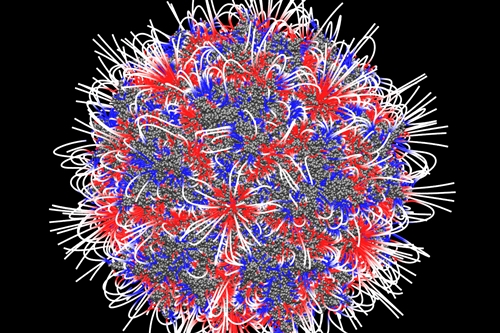22 September 2017. Medical researchers show that transferring healthy genes can protect nerve cells in lab mice against damage from multiple sclerosis, and help reverse effects of the disease. A team from University of Florida in Gainesville describe the technique in yesterday’s issue of the journal Molecular Therapy.
The researchers are led by immunologist Brad Hoffman who studies gene therapies to treat immune system disorders. Among those disorders is multiple sclerosis, an autoimmune condition where the immune system attacks the central nervous system and damages myelin, the fatty, protective substance around nerve fibers, as well as nerve cells themselves. Scar tissue from the damaged myelin, known as sclerosis, distorts the nerve signals sent to and from the brain and spinal cord, causing symptoms ranging from mild numbness to loss of vision or paralysis.
In multiple sclerosis and other autoimmune disorders, regulatory T-cells in the immune system fail to keep other immune system cells from attacking healthy tissue. The authors note that gene therapies designed to improve or correct the faulty regulation of errant immune system cells are shown to be safe when tested in patients with type 1 diabetes or graft-versus-host disease, but they so far returned temporary or limited results. Hoffman and colleagues, therefore are seeking more effective and sustained solutions, but still with gene therapy.
The Florida team chose to test a strategy of transferring healthy genes with the full sequence of myelin-producing proteins, called myelin oligodendrocyte glycoproteins or MOGs, to the liver, considered among the best environments for developing robust immune-tolerant cells. For transferring the genes, the researchers used adeno-associated viruses, benign and naturally occurring microbes that can infect cells, but do not integrate with the cell’s genome. Clinical trials cited by the authors show adeno-associated viruses are safe for humans, causing no more than mild reactions.
The researchers tested this approach in lab mice, where transferred MOGs restore immune tolerance by generating regulatory T-cells that protect against immune-system attacks against myelin surrounding nerve cells. The results show 1 injection of adeno-associated viruses transferring MOGs protect the myelin in mice for as long as 7 months.
The team also tested the transferred MOGs as a treatment in mice induced with a form of multiple sclerosis, where the gene therapy is used with rapamycin, a drug given to suppress the immune system in organ transplants. The results show transferring MOGs after giving this drug restores immune tolerance for myelin in mice with mild and moderate forms of multiple sclerosis. In some mice with paralysis in their limbs, movement in those limbs is also restored. The effects of the treatment continued until the end of of the experiments, about 100 days. Only mice with end-stage forms of the disease do not respond to the gene transfer treatments.
University of Florida applied for a patent on this technology, with Hoffman listed as its inventor.
More from Science & Enterprise:
- Simple Cell Programming Designed for Gene Therapies
- AstraZeneca, Biotech Partner on Messenger RNA Therapies
- FDA Grants Priority Review for Gene Therapy
- Gene Therapy Start-Up Raises $41M in Early Funds
- Trial to Test Gene Therapy for Inherited Eye Disease
* * *


 RSS - Posts
RSS - Posts
You must be logged in to post a comment.